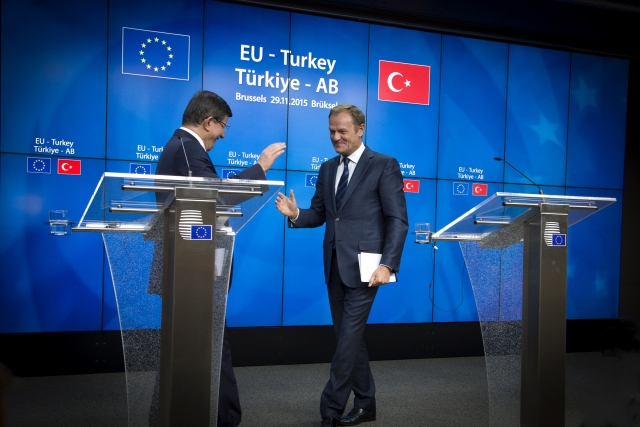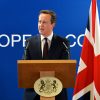
Turkey and the EU struck a bargain under which the country whose European Union accession process has virtually ground to a halt will stem migrant flows to Europe in return for €3 billion in aid, fast-tracked visa privileges and the prospect of revived EU talks.
Turkey is the key country for cutting migration flows as it shares borders with Syria and Iraq, to the south, from which most migrants are fleeing. It also has borders with Greece to the west and Bulgaria to the northwest (as well as Greek islands off its coast) – a route into the EU used by more than 700,000 asylum seekers this year. There are an estimated 2.2 million Syrians in Turkey.
EU leaders set aside growing concerns about the lack of democracy in Turkey and the authoritarian behaviour of President Recep Tayyip Erdoğan (president since 2014 after 11 years as prime minister) in a marriage of convenience. Realpolitik won the day.
Turkey has been negotiating EU membership since October 2005, and has made little progress. When the Islamist-rooted Justice and Development Party began the accession process, Brussels had leverage over Ankara and this produced an unprecedented period of reforms. This has been gradually eroded, and now it is Ankara calling the shots.
Turkey, however, is not the only key to solving the migration crisis. ‘The most important one is our responsibility and duty to protect our external borders’ said Donald Tusk, the president of the European Council who chaired the summit with Turkey. ‘We cannot outsource this obligation to any third country. I will repeat this again: without control on our external borders, Schengen will become history.’
Schengen is the 26-country free-travel zone in the EU, which is in danger of unravelling because of jihadist terrorism and massive illegal migration.
Angela Merkel, Germany’s Chancellor, held talks with various other EU leaders on the sidelines of the summit about directly resettling refugees currently in Turkey under a system of voluntary quotas.
The deal with Turkey came a couple of days after the arrest of the editor and a journalist at the opposition newspaper Cumhuriyet for publishing footage that Erdogan disliked and the murder of Tahir Elci, a prominent Kurdish lawyer in the troubled south-east. The footage purported to show the state intelligence agency sending weapons to Islamic State in Syria. Can Dundar, the editor, published an open letter to EU leaders urging them not to give priority to the refugee crisis over the rule of law and human rights in Turkey.
Prime Minister Ahmet Davutoglu hailed the agreement as a ‘historic day’ in Turkey’s relations with the EU. Just how the stalled EU accession will be revitalized remains to be seen, as a road map to achieve this was not set out. Other parts of the deal are also not clear, including the time period for the €3 billion payment and the format for twice-yearly summits between Turkey and the EU. Similarly, giving 75 million Turks visa-free access to the Schengen area at a time when unrestricted movement within the area is under question and Islamophobia is on the rise is a controversial issue.
Only 14 of the 33 chapters of the acquis that require negotiations have been opened in 10 years (the last one in November 2013) and just one provisionally closed. The main stumbling block is Turkey’s failure to implement the 2005 Additional Protocol to the Ankara Agreement and extend its customs union with the EU by opening its ports and airports to Greek-Cypriot traffic and thus recognise the Republic of Cyprus, divided since Turkey’s 1974 invasion of the island and an EU member since 2004 (the writ of EU law does not run in the internationally unrecognised Turkish Republic of Northern Cyprus). As a result, the EU suspended at the end of 2006 the opening of eight chapters related to the Customs Union and announced that no more chapters would be provisionally closed until Turkey had fulfilled its commitment. France and Cyprus have unilaterally blocked other chapters.
Ankara wants the EU to implement the 2004 decision of the Council of Ministers to end the isolation of the TRNC. The promise was made two days after Turkish Cypriots voted in favour of the Annan Plan to reunify the island (rejected by Greek Cypriots).
The Greek Cypriot and Turkish Cypriot leaders have given encouraging signs that they are making progress in reunifying the island, one of the world’s most intractable diplomatic disputes, but reunification, unlike fulfilling the Ankara protocol, is not a specific requirement for EU accession, though Turkey’s EU membership is inconceivable without ending the division of Cyprus.
Given Turkey’s flawed democracy, the best way to move EU accession forward, and in the process put the autocratic Erdoğan’s flagging democratic credentials to the test, would be to open chapter 23 of the acquis on judicial and fundamental rights and chapter 24 on justice, security and freedoms. These two chapters, however, are among those blocked by the Republic of Cyprus since 2009.
A lot of arm twisting will be needed to get Cyprus to back off.


